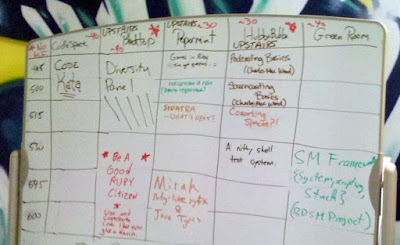I enjoyed the conference last week. Serious props to Marty and the rest of the organizers. I wish I could have gone to more of it.
Mini Code Retreat
The code retreat went pretty well. I think the people who showed up had a good time, and learned a thing or two. We had about 16 people show up initially, with some leaving after the first session.
It was my second time co-facilitating. I still get that, “Do I really know what I’m doing?” feeling, but I’ve gotten better about it. The thing that was hard for me was not asking as many questions. I want to see what people are thinking, and how they are conceptualizing what they are doing.
But, that’s not really necessary. I think my most important role in code retreat is enforcing the structure. Getting people to do more pairing with others that they don’t know, making sure the sessions run on time, that sort of thing. Which I certainly did.
Prakash facilitated with me. It was his first time doing it, and he totally rocked it. Together we had a lot of fun introducing some people to what code retreat is, and hopefully got them thinking about their craft in a way that will affect their day to day coding. Or at least that they had fun.
Conferencing
I could only go to the sessions on Thursday due to some timing issues on Friday, but I really enjoyed the talks I saw.
Mike Gehard encouraged us all to meditate three times a week and tweet about it with the tag #devmed. So far I’ve managed to meditate in the mornings twice. My goal is to meditate for 10 minutes Monday/Wednesday/Friday, but we’ll see how that goes.
Michael Feathers’ keynote was on code blindness. He talked about how organizations who don’t deal directly in software tend to view and manage their software development and the stages they go through as they improve or don’t. There was a lot of good stuff in there. I thought the stages of code blindness/better understanding and management resonated with other things I’d read and experienced.
I came away with a few key things that affected me. One is to plan for your software’s obsolescence. Face it, code has a lifecycle. Another was that metrics are only useful in context. “We’re 5 this week & we were 4 last week”–what does that mean? Also, don’t make metrics into goals, unless you want people to meet them to the exclusion of other, more useful things.
API Design Matters by Anthony Eden really resonated with me. Shipping software the last year or so, I’ve become more aware of the issues inherent in developing an API. I really think Readme Driven Design, and building the client code first, etc are really useful. Those are the sorts of things I think about working on Mirah and the other OSS projects I work on. They help you create an API that is fun and quick to understand. Not to say it’s easy to do though.
REST and Hypermedia by Nick Sutterer. Apparently I’ve been doing it wrong all this time. In short, this is “APIs need links too.” More specifically, clients should never have to construct a URL beyond the initial entry point into your system. Every API response should contain within it links with associated actions s.t. a client can just traverse your system from one point to the next. Kind of like a person with a browser.
Exceptional Ruby by Avdi Grimm. This was awesome. The examples were short and to the point. And, they were easy to understand. Exceptions in Ruby are really nifty. I need to play with hammertime.
Mastering the Ruby Debugger by Jim Weirich. Jim’s a really good speaker. I always enjoy listening to his talks. I don’t really have much experience with Ruby’s debugger. This primer made me feel like if I needed to, I could just drop in and use it. He also introduced us to the pry library, which is a really cool little gem for inspecting object state.
Unconference
I went to the unconference on Thursday evening and sat in on the Diversity Panel, and gave a short talk on Mirah.
We talked about the lack of diversity in our profession and the current dearth of good engineers and what to do about it. At the end, we came up with some things to do to bring more people into our community.
All in all, I enjoyed myself, met a lot of new and interesting people and learned quite a bit.
